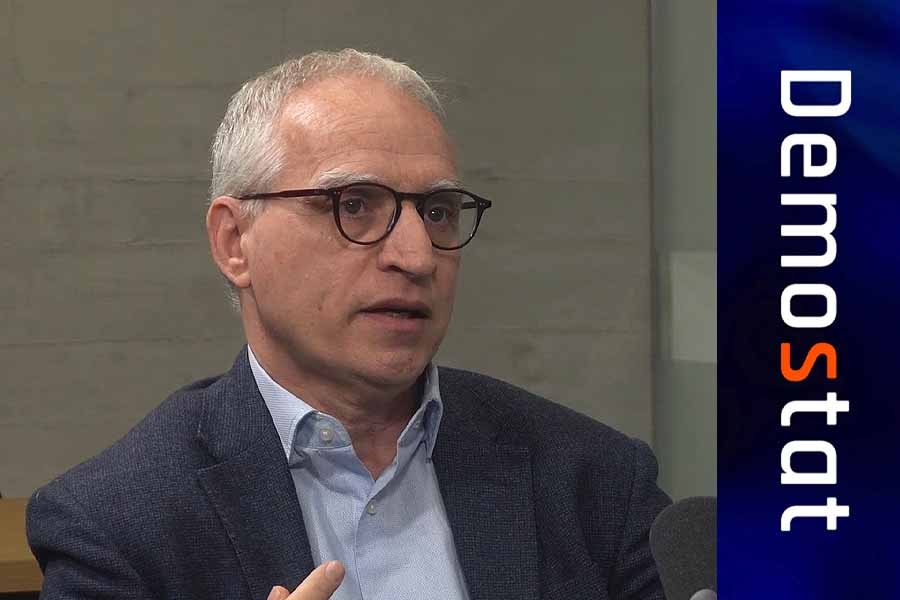Serbian lithium is among the three most important topics in the relations between the Western Balkans and the European Union, but nobody in Serbia openly talks about it," says Goran Svilanovic, former Minister of Foreign Affairs and former Secretary-General of the Regional Cooperation Council, in an interview with Demostat. In Demostats "Half an Hour of Demostat" program, Svilanovic emphasizes the importance of announcing this to start an open discussion in the public about the potential damage and the benefits for the country from lithium mining. He mentions the possibility of Serbia becoming one of the EUs suppliers of critical materials, which opens up the opportunity for our country to be more important than before in the eyes of European partners in a geopolitical sense and also raises the question of how Serbia could use this in an economic sense. Svilanovic explains that after the pandemic and the war in Ukraine, the EU decided to reduce its dependency on China and Russia as much as possible and, therefore, is looking in its wider environment for countries that could be part of redefined supply chains, including for critical materials. Serbia has appeared in this context.

Serbian lithium is among the three most important topics in the relations between the Western Balkans and the European Union, but nobody in Serbia openly talks about it," says Goran Svilanovic, former Minister of Foreign Affairs and former Secretary-General of the Regional Cooperation Council, in an interview with Demostat. In Demostats "Half an Hour of Demostat" program, Svilanovic emphasizes the importance of announcing this to start an open discussion in the public about the potential damage and the benefits for the country from lithium mining. He mentions the possibility of Serbia becoming one of the EUs suppliers of critical materials, which opens up the opportunity for our country to be more important than before in the eyes of European partners in a geopolitical sense and also raises the question of how Serbia could use this in an economic sense. Svilanovic explains that after the pandemic and the war in Ukraine, the EU decided to reduce its dependency on China and Russia as much as possible and, therefore, is looking in its wider environment for countries that could be part of redefined supply chains, including for critical materials. Serbia has appeared in this context.

The European Union has learned important lessons after the pandemic and the war in Ukraine - that it did not invest enough in the pharmaceutical industry and medicines, that its level of dependence on Russian gas is enormous, and that it must seek new partners in supply chains for critical materials needed, among other things, for the green agenda, as it almost entirely depends on others, especially China.
"The EU wants to be less dependent on China and Russia and is looking in its wider environment for who these possible suppliers could be. And here Serbia has appeared, but Serbia is not the only one," emphasizes Svilanovic in the "Half an Hour of Demostat".
He mentions that he first encountered this fact two years ago at the Alpbach Forum in Austria, when the then Director for the Western Balkans at the European External Action Service spoke about the lessons learned and, in that context, mentioned Serbian lithium.
"We were shocked in the room when we heard that. First, the people from Kosovo, Albania, Bosnia and Herzegovina, and Montenegro said - so you only talk about Serbia, and our reaction was - but this is something very questionable in the Serbian public... We reacted - wait, what are you talking about? And the answer was - yes, we only see Serbia," Svilanovic relayed.
Two years later, as he states, Sweden, as the EUs presidency in July 2023, proposed the formation of a high-level group of about thirty people, of which he is a member, tasked with drafting a report on interdependence between the EU and its neighborhood - about which countries the EU has good communication with and which countries could be part of redefined supply chains.
"We are not talking about membership, but about energy dependence, food, people, where does the workforce come from, why are we facing migrants... And in this context, the topic of critical raw materials and materials necessary for the whole region opened up," explained Svilanovic.
"The possibility for Serbia to become one of the suppliers of critical materials to the European Union has opened up space for Serbia to be more important than before in the eyes of European partners - this implies a new, more favorable geopolitical position, but also raises the question of how this will be used both in geopolitical and economic terms," he states.
Svilanovic explains that critical raw materials are the third most crucial topic in the relationship between the European Union and the Western Balkans, as confirmed at the Tirana summits in October and Brussels in November 2023.
He mentions that at the meeting of European and Western Balkan economic ministers at the Summit in Tirana within the Berlin Process, the following was agreed upon: a joint market, economic improvement, and overcoming the crisis within CEFTA, and, in third place, integrating the Western Balkans into the European Alliance for Critical Raw Materials.
At the meeting of heads of state and government at the same Summit, the issue of a joint market for the Western Balkans was agreed upon, which should become part of a single free trade zone of the whole of Europe, improvement of work with youth, education, and research, and under three – partnership in the value chain for critical raw materials.
However, this is not being discussed, Svilanovic emphasizes.
“Even the part of the Serbian public that is still for the EU in the new circumstances, Im talking about non-governmental organizations, does not want to say that this is a topic. I accept that people have the right to say that they disagree with it, that they are not for the EU, not for such an EU, and that it is a colonialist approach, but I want to hear it. And it is okay to say that, but then to openly discuss whether it is so, what we want, whether we want to pay some price. The country does things that are not good for it, but in the end, draws the line and says – this is damage, but whether it pays off for me or not depends on how much real damage is there, which is not being discussed properly, and what is the profit and how much it really is,” Svilanovic pointed out.
He notes that lithium has nothing to do with Kosovo and that there is no compensation of "slightly better resolved Kosovo for Serbian lithium."
Speaking about the lithium mining project in Serbia, Svilanovic says that the critical question is whether we have trust in the government, whichever it may be, to manage such a complex process and whether there are control institutions that will monitor environmental issues.
“There is no trust, and nobody believes anyone. Should it be the Serbian Academy of Sciences and Arts (SANU), the university, or foreigners, which group of people will be able to externally monitor whether a private company is fulfilling everything it promised, whether the Government is taking care to ensure that a group of people does not profit while the citizens do not feel the benefit. Who will control the process,” says Svilanovic.
He says that the lithium mining project would be a massive project that should be handled by a brain trust, dealing with all aspects – from environmental protection, water, air, and waste disposal to economic benefits and process control.
“It should be a serious question where the state is in all this because this is private business. Who will benefit from it? This is the countrys resource – if we will have damage, lets see how much we earn. Whether its just mining rent or something more for Serbia, which implies a stake in the project, which can happen if a large automotive industry comes,” emphasizes Svilanovic.
Svilanovic explains that the investor must submit two documents for every project, even less complex ones.
The first is an environmental impact study, which is conducted according to Serbian standards and submitted to Serbian authorities, from whom it receives verification to continue with the project.
However, to get funding, the investor must approach the European Investment Bank, EBRD, World Bank, or private banks, which require a second document with stricter standards – the so-called Environmental Social Impact Assessment.
“These two documents are necessary for the project we are talking about. When submitted, they should indicate the impact on the environment, which water is used, whether it affects the biosphere, to what extent it affects agriculture...” he says.
However, Svilanovic assesses that the central problem is the enormous level of distrust in all institutions and that every issue in Serbia is perceived personally and politically.
Consequently, anyone who thinks that the lithium mining project could be good for Serbia is automatically categorized with those who support President Aleksandar Vu?i?, who has repeatedly stated regret that the Serbian Government suspended the Jadar project.
“If someone says they are for that project, they immediately say, you vote for him. No, I don’t; it has nothing to do with it because if this is going to be done for the next 40 years, then surely we will change the government,” says Svilanovic.
Speaking about the European Growth Plan for the Western Balkans, Svilanovic said that the EU plans to allocate six billion euros for the economic advancement of the region, of which, he says, two billion euros are estimated to go to critical materials in Serbia.
“To understand the scale of relations, how big the story about critical materials is for Serbia compared to the total allocation of six billion euros for the Western Balkans,” Svilanovic points out.
Svilanovic said he does not lose faith that Serbia should become a member of the EU and that it is realistic for it to become part of the European Unions economic zone first.
Asked whether Serbia could be admitted out of turn, Svilanovic notes that Ukraine is paying a bloody price with tens of thousands of victims to be seen as a potential member.
“Lets not miss this opportunity too. The reality is that we are Europe. Serbia, together with its neighbors, can become part of the European free trade zone, part of the European market in every way, like Switzerland and Norway today, and then from that position, in the next step, discuss whether there is room to be a member,” he says.
In all societies there are issues that are rather being skipped. Certain...
The neoliberal path, started in 2001, has led to especially bad results in Serbi...
For centuries, the region was subsumed within the Ottoman and Hungarian Empires,...
"Serbia has returned to the systemic and anti-systemic position of the political...
In reality, Serbia is closer than ever to NATO. In the course of the last five y...